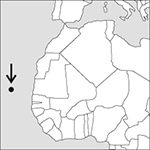
Source: MAPS IN MINUTES™ © RH Publications (1997)
Capital:
Praia
Area:
4033 sq km (1557 sq miles)
Population:
531,046 (2013 est)
Currency:
Escudo Caboverdiano = 100 centavos
Religions:
Roman Catholic; Protestant
Ethnic Groups:
Creole (mulatto) 71.0%; African 28.0%; European 1.0%
Languages:
Portuguese (official); Portuguese creole (crioulo)
International Organizations:
UN; AU; ECOWAS; Non-Aligned Movement; WTO
A country comprising an archipelago of volcanic islands in the Atlantic Ocean, 570 km (350 miles) westof Cape Verde Peninsula, Senegal, the most westerly point of Africa. Since 2013, its official name has been Cabo Verde.
Physical
The archipelago is in two groups, Windward and Leeward, and consists in all of ten islands and five islets. Sheer cliffs rise from the sea, and the inland slopes present a jagged landscape as a result of erosion by wind-blown sand.
Economy
Agriculture and industry are limited, and commerce, transport, tourism, and public services are the main economic activities. The domestic economy relies heavily on remittances from Cape Verdeans working overseas. In 2007 it moved from ’least developed country’ status to ‘developing country’ status.
History
The islands were uninhabited until they were colonized by the Portuguese from 1462, and were used as a base for the Portuguese slave trade. In 1951 Cape Verde became an overseas province of Portugal and its residents were given Portuguese citizenship in 1961. An independence movement for Cape Verde and Guinea-Bissau gained strength during the 1950s and 1960s, and later became the African Party for the Independence of Guinea and Cape Verde (PAIGC). Cape Verde gained full independence in 1975, but remained linked with Guinea-Bissau as the PAIGC was the only legal political party in both countries. In 1980 the PAIGC in Guinea-Bissau was ousted in a coup and the party in Cape Verde dropped the reference to Guinea-Bissau from its name, becoming the PAICV. A multiparty constitution was adopted in 1991, and elections that same year were won by the newly created Movement for Democracy (Portuguese: Movimento para Democracia, MpD). The PAICV was returned to power in the 2001 elections and again in 2006 and 2011. However, the MPD won the 2016 elections against a background of increasing economic problems.
- Klotz test
- kludge
- Klug, Sir Aaron
- klystron
- K magnitude
- K-map
- kmol
- KMP algorithm
- knapsack problem
- knee-jerk reflex
- knee twin
- knick point
- knife-edge test
- knighthood
- Knight Hospitaller
- Knights of Labor
- Knight Templar
- knob and kettle
- Knobby Terrain
- knock and lochan
- knockin
- knocking
- knock-on effect
- knockout
- knockout drum